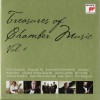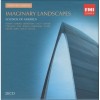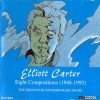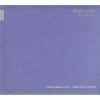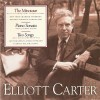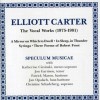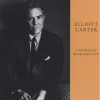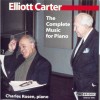| Country: | United States Of America |
| Period: | Neoclassicism |
Biography
Elliott Cook Carter, Jr. (December 11, 1908 – November 5, 2012) was an American composer who was twice awarded the Pulitzer Prize. He studied with Nadia Boulanger in Paris in the 1930s, then returned to the United States. After an early neoclassical phase, his style shifted to an emphasis on atonality and rhythmic complexity. His compositions are known and performed throughout the world; they include orchestral, chamber music, solo instrumental, and vocal works.
He was extremely productive in his later years, publishing more than 40 works between the ages of 90 and 100,[1] and over 20 more after he turned 100 in 2008.[2] His last work, Epigrams for piano trio, was completed on August 13, 2012.
Elliott Cook Carter Jr. was born in Manhattan on December 11, 1908, the son of a wealthy lace importer. Carter's father was Elliott Carter Sr. and his mother was the former Florence Chambers. As a teenager, he developed an interest in music and was encouraged in this regard by the composer Charles Ives (who sold insurance to Carter's family). While he was a student at the Horace Mann School, he wrote an admiring letter to Ives, a New Englander with a crusty manner who nevertheless responded and urged him to pursue his interest in music. In 1924, a galvanized 15-year-old Carter was in the audience when Pierre Monteux conducted the Boston Symphony Orchestra in the New York première of The Rite of Spring, according to a 2008 report. Carter was again in attendance (see below) in Carnegie Hall, on the occasion of his 100th birthday in 2008, when the orchestra, now under James Levine, again performed the Stravinsky piece as part of its tribute to Carter.[4] Although Carter majored in English at Harvard College, he also studied music there and at the nearby Longy School of Music. His professors at Harvard included Walter Piston and Gustav Holst. He sang with the Harvard Glee Club and did graduate work in music at Harvard, from which he received a master's degree in music in 1932. He then went to Paris to study with Nadia Boulanger (as did many other American composers). Carter worked with Boulanger from 1932 to 1935, and in that year received a doctorate in music (Mus.D.) from the École Normale in Paris. Later that same year, he returned to the US and wrote music for the Ballet Caravan.
From 1940 to 1944, he taught in the program, including music, at St. John's College in Annapolis, Maryland. On July 6, 1939, Carter married Helen Frost-Jones. They had one child, a son, David Chambers Carter. During World War II, he worked for the Office of War Information. He later held teaching posts at the Peabody Conservatory (1946–1948), Columbia University, Queens College, New York (1955–56), Yale University (1960–62), Cornell University (from 1967) and the Juilliard School (from 1972). In 1967, he was appointed a member of the American Academy of Arts and Letters. In 1981, he was awarded the Ernst von Siemens Music Prize, in 1985 the National Medal of Arts. He lived with his wife in the same apartment in Greenwich Village from the time they bought it in 1945 to her death in 2003.[1]
On December 11, 2008, Carter celebrated his 100th birthday at Carnegie Hall in New York, where the Boston Symphony Orchestra and pianist Daniel Barenboim played his Interventions for Piano and Orchestra written that year. Between the ages of 90 and 100 he published more than 40 works, and after his 100th birthday he composed at least 20 more.[1]
On February 7, 2009, he was given the Trustees Award (a lifetime achievement award given to non-performers) by the Grammy Awards.[5]
He was on the faculty of the Tanglewood Music Center, where he gave annual composition master classes. In June 2012, the French government named him a Commandeur de la Légion d'honneur.[6]
Carter died of natural causes on November 5, 2012 at his home in New York City, at age 103.









